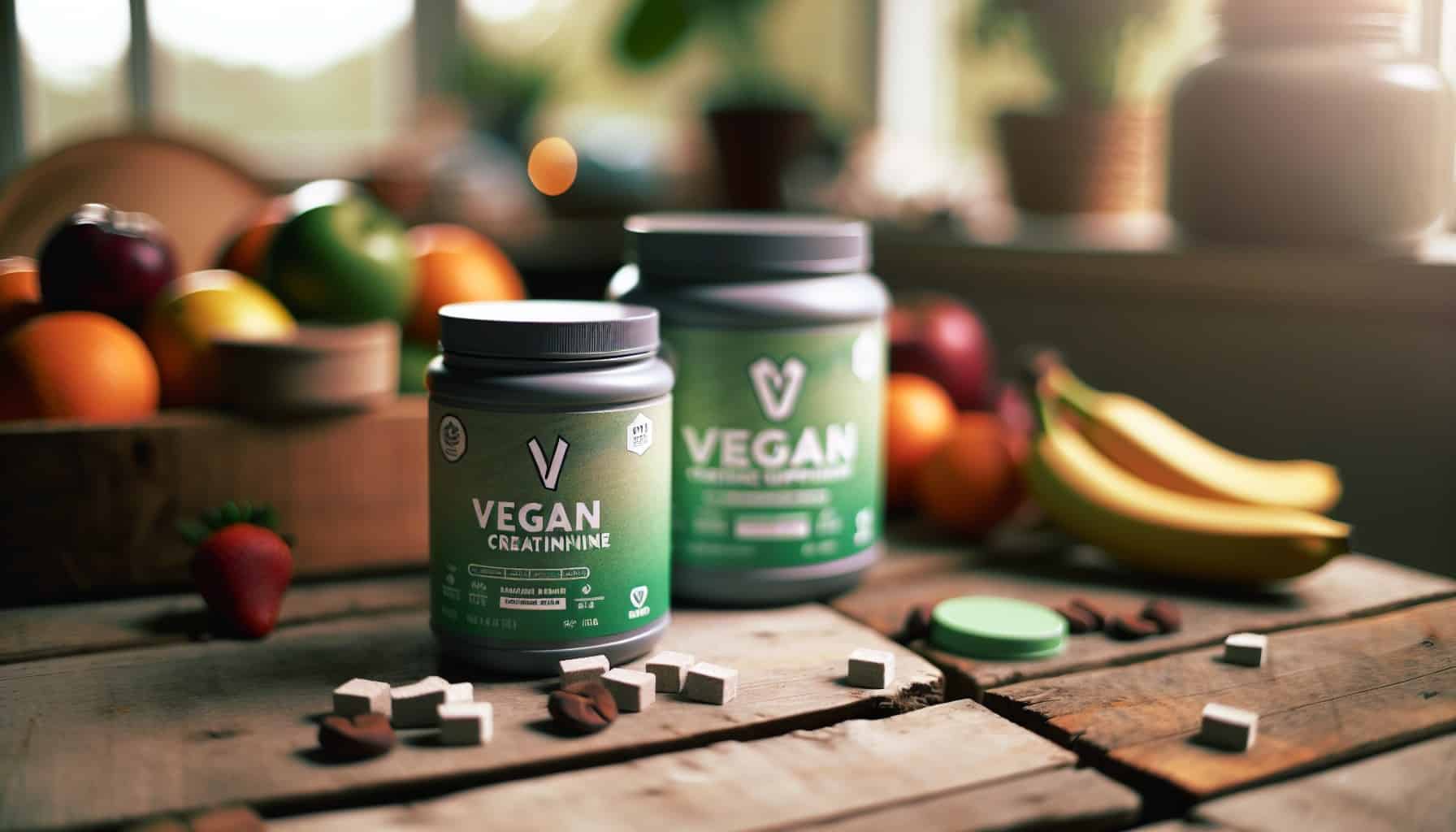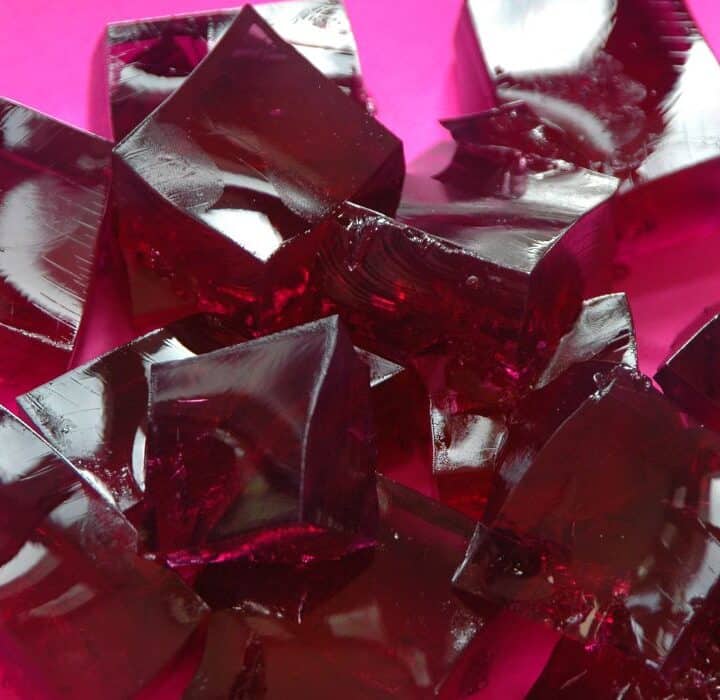Searching for vegan-friendly creatine options? You’re in luck—vegan creatine supplements are synthesized to fuel your fitness while adhering to vegan standards. This guide will help you navigate the market to find products that fit your vegan lifestyle and answer the question, “is creatine vegan?” without overwhelming you with unnecessary details.
Key Takeaways
Vegan creatine supplements, synthesized from non-animal sources such as cyanamide and sarcosine, are suitable for vegan athletes, who should ensure to avoid products with animal derivatives like gelatin by carefully reading labels and opting for supplements explicitly labeled as vegan.
Creatine is critical in energy metabolism for high-intensity physical activities as it helps quickly regenerate ATP, using the phosphocreatine system, and can enhance muscle mass and recovery, which is particularly beneficial for vegetarians and vegans with naturally lower creatine stores.
Vegan-friendly creatine is available in various forms, such as powder and capsules; choosing third-party-tested products ensures purity, the absence of banned substances, and adherence to vegan standards, which is crucial for vegan athletes’ health and performance.
Decoding the Vegan Status of Creatine

Creatine, a vital molecule for energy production during high-intensity workouts, is naturally found in animal-based foods like red meat. However, creatine is not inherently vegan, posing a challenge for vegan athletes and fitness enthusiasts. Thankfully, there exists a class of vegan creatine supplements. These are synthesized from non-animal sources such as cyanamide and sarcosine, ensuring its suitability for vegans.
Remember, not all creatine supplements are vegan-friendly. In fact, some might contain animal-derived ingredients like gelatin, particularly in capsule forms. So, vegan consumers should meticulously read supplement labels and choose products that are explicitly labeled as vegan.
Synthetic vs Natural Creatine Sources
Synthetic vegan creatine is produced by combining cyanamide with sarcosine, ingredients not derived from animals. This forms a compound safe for human consumption and suitable for vegans. On the other hand, natural creatine is obtained from foods like red meat and fish, which are animal-based and not suitable for a vegan diet.
Choosing synthetic vegan creatine supplements not only adheres to vegan principles but also ensures a safe and effective form of creatine for those who avoid animal-based food sources. This makes synthetic vegan creatine a valuable option for those seeking to enhance their fitness performance while adhering to a vegan lifestyle.
Identifying Animal Products in Supplements
Gelatin is a common ingredient found in the capsule forms of creatine supplements. Derived from animal parts, gelatin is not suitable for vegans. This underscores the need for vegans to read supplement labels thoroughly to identify potential animal-derived ingredients. Such vigilance ensures that the creatine product aligns with vegan principles.
Bear in mind that some supplements, even without clear animal-derived ingredients, may be at risk of cross-contamination. A sure way to avoid this ambiguity is to choose products explicitly labeled as vegan. This guarantees the absence of hidden non-vegan additives, ensuring the supplement’s vegan nature.
The Science Behind Creatine Supplements
Creatine plays a crucial role in our bodies, especially during high-intensity exercises. It helps to generate the energy needed for such activities. Creatine combines with a phosphate molecule to form creatine phosphate, a substance crucial for the regeneration of ATP during muscle contraction. This process enhances the creatine phosphate stores in muscles, creating more ATP for energy, which is vital during physical exertion.
Creatine supplementation is particularly beneficial for high-intensity, short-duration activities like sprinting and weightlifting. It increases the phosphocreatine stores within muscles, providing a quick energy source. This function is vital, supplying energy to the body for day-to-day activities and intense workout sessions.
Role of Creatine in Muscle Energy Metabolism
Creatine plays a pivotal role in rapidly regenerating adenosine triphosphate (ATP) during high-intensity activities through the phosphocreatine (PCr) system. During muscle contraction, ATP is swiftly depleted, and creatine phosphate contributes a phosphate group to adenosine diphosphate (ADP) to replenish ATP. This process facilitates sustained muscle contraction during the onset of high-intensity exercise.
Creatine kinase, the enzyme executing this transfer, plays a key role in ATP regeneration and energy supply maintenance in skeletal muscles. The phosphocreatine energy system serves as the main source of ATP during the first 10 seconds of intensified physical activity, enabling quick energy bursts.
Serving as an energy shuttle, creatine links the energy production sites to the ATP utilization subcellular locations, a key process for energy metabolism during intense exertion.
Impact on Muscle Mass and Recovery
Creatine supplementation has several benefits, including:
Enhancing the body’s ability to produce ATP
Promoting muscle hypertrophy through increased cell volume and water retention
Triggering anabolic pathways
Increasing muscle mass and training volume intensity
Aiding in muscle recovery after exhaustive efforts by reducing muscle cell damage, inflammation, and the amount of protein breakdown.
Vegetarian athletes generally have lower baseline stores of creatine. Studies show that creatine supplementation can significantly increase their:
lean tissue mass
strength
endurance
performance in high-intensity activities
The incremental muscle growth and recovery facilitated by creatine supplementation are beneficial for vegetarians and those engaged in weight training, potentially enhancing training outcomes and athletic performance.
Choosing Vegan-Friendly Creatine Options

Vegan athletes seeking the benefits of creatine supplementation have a variety of options to choose from. Vegan-friendly creatine supplements, including vegan creatine powder, are available in various forms such as powders and capsules. These products are often confirmed by vegan certification and are produced without animal-based ingredients. However, it’s imperative to confirm that these supplements have been subjected to third-party testing for purity and safety verification.
Some vegan creatine supplements contain additional ingredients like black pepper extract, which enhances the absorption of creatine. Others, like Transparent Labs Creatine HMB, are 100% plant-based, making them suitable for vegans. When choosing a vegan creatine supplement, prioritize transparency in ingredient labeling.
Powder Form vs Capsule Form

When it comes to creatine supplements, they are available in powder or capsule form. Micronized creatine monohydrate powders have smaller crystals, enhancing their solubility in beverages and increasing absorption leading to greater increases in creatine stores in the body. Creatine HCL, on the other hand, is substantially more soluble in liquid, which can be a consideration in terms of digestion and absorption.
Vegan athletes need to ensure that creatine capsules are free from gelatin, an animal-based ingredient. However, it’s worth noting that some creatine capsules might require multiple servings to reach the equivalent dose found in powder form, which may affect convenience and cost-effectiveness.
Importance of Third-Party Testing
Third-party testing provides an additional layer of assurance for vegan creatine supplements. It ensures that athletes will not accidentally test positive for banned substances, offering peace of mind and safety in use. Certifications from authoritative organizations such as Informed Choice, NSF, and Informed Sport indicate that vegan creatine supplements have been rigorously tested and meet high standards for safety and compliance.
Third-party testing guarantees the absence of banned substances and harmful contaminants in vegan creatine supplements. It verifies the accuracy of the ingredient list and the product’s purity and potency. By looking for third-party testing and certifications, vegans can confirm the absence of animal-derived ingredients in their creatine supplement, assuring its vegan status.
Vegan Diet and Creatine Supplementation
Vegans may have lower baseline creatine levels as key dietary sources of creatine like red meat, fish, and poultry are not part of a vegan diet. As a result, muscle creatine stores are lower in comparison to omnivores. This difference arises due to the vegetarian diet.
Creatine supplementation can be particularly beneficial for vegans, aiding in:
muscle protein synthesis
improving recovery
increasing creatine stores
enhancing performance in high-intensity exercise.
Micronized creatine monohydrate powder offers the following benefits for vegans:
Faster absorption rates
Elevated levels of creatine and phosphocreatine post-supplementation
Enhanced performance and recovery, especially in high-intensity sports
These benefits are advantageous for vegans whose diet may result in lower natural creatine levels.
Addressing Nutritional Gaps for Vegans
Vegan diets may lead to compromised creatine synthesis due to lower intakes of certain amino acids needed for its production. Amino acids such as arginine, glycine, and methionine, which are crucial for creatine production, are less abundant in a vegan diet due to their primary presence in animal products.
Supplemental creatine at a dose of around 1 gram per day can prevent reductions in muscle creatine levels in those with vegetarian diets. Vegan athletes with greater muscle mass or higher activity levels may require 3-5 grams of creatine maintenance dosage for optimal results.
Enhancing Athletic Performance with Supplements
Creatine supplementation can significantly boost athletic performance. Vegan bodybuilders and athletes commonly use creatine supplements, which are made from synthetic, non-animal sources, to enhance performance. Athletes in power sports such as:
Bodybuilding
Football
Hockey
Wrestling
Athletes often utilize most creatine supplements for their performance-enhancing effects.
Creatine supplementation, when paired with resistance training, can lead to increased lean muscle mass and muscle endurance. This particularly benefits vegetarian and likely vegan athletes. Vegan athletes are recommended to consider supplements offering 5 grams of creatine monohydrate per serving, taken close to workout times to maximize performance benefits.
Top Vegan Creatine Monohydrate Picks for 2024

In 2024, vegan athletes have an array of high-quality creatine supplements to choose from, including the best vegan creatine supplements like Jacked Factory Creatine and Naked Creatine. Both of these supplements stand out for their purity, performance-enhancing potential, and adherence to vegan principles. They provide pure, plant-based options that are suitable for vegans and are free from animal-derived ingredients.
When considering cost-effectiveness for long-term supplementation, the price per serving is a crucial factor. Both Jacked Factory Creatine and Naked Creatine offer competitive prices, with Jacked Factory Creatine priced at $35.99 and Naked Creatine at $59.95, offering value for money to vegan fitness enthusiasts.
Featured Product: Jacked Factory Creatine
The Jacked Factory Creatine Monohydrate provides 5,000 mg of pure micronized creatine monohydrate per scoop, ensuring no fillers or dyes are included. The product is confirmed vegan, dairy-free, and non-GMO, making it suitable for individuals on a vegan diet.
Produced in a cGMP-certified, FDA-registered facility, Jacked Factory Creatine Monohydrate adheres to premium manufacturing standards.
Featured Product: Naked Creatine
Naked Creatine offers a pure, unflavored creatine powder, specifically in the form of creatine monohydrate, with no additives or artificial ingredients. It provides the benefits of creatine supplementation without any unnecessary substances that don’t benefit health or performance.
The purity of Naked Creatine makes it an excellent choice for vegan athletes seeking a straightforward, effective creatine supplement.
How to Integrate Creatine into Your Vegan Lifestyle

Integrating creatine into a vegan lifestyle involves understanding the loading phase, daily maintenance dosage, and choosing the right supplement form. The variety of vegan creatine supplements available include powders and capsules, with some offering additional ingredients for recovery and nutrient absorption.
The taste and solubility of vegan creatine are also important factors to consider for ensuring a positive supplementation experience and adherence to a routine.
Understanding the Loading Phase
The creatine loading phase involves taking 20-25g per day, divided into 5g doses 4-5 times per day for about a week. This allows for rapid saturation of muscle creatine stores. This loading phase is not strictly required to increase intramuscular creatine stores; a consistent daily dosage of 3-5 g/day can also be effective over time.
Daily Maintenance Dosage
After the loading phase, maintaining a daily dose of creatine is necessary. A dose of 3-5 grams of creatine monohydrate is recommended post-loading phase for vegans to sustain muscle creatine levels. Consistent daily intake of creatine is necessary to uphold its beneficial effects.
Creatine should be consumed on both workout and rest days to prevent creatine degradation from exceeding its synthesis and intake.
Potential Side Effects and Considerations
While creatine supplementation is generally safe, some individuals may experience minor side effects. Excessive creatine intake can lead to adverse effects like gastrointestinal disturbances and muscle cramps in some individuals. However, well-controlled studies have found no evidence of liver or kidney dysfunction from creatine supplementation based on serum enzymes, urea production, or renal function. Research also contradicts the myth that creatine supplementation causes dehydration and muscle cramping; rather, it may reduce cramping and prevent heat illness.
Also, ensure that the chosen creatine supplements are devoid of heavy metals and other harmful contaminants. Opting for creatine supplements with third-party certifications ensures the product is free from these harmful elements.
Creatine Myths Debunked
Several myths surround creatine usage. Some people mistakenly believe that creatine is an anabolic steroid. However, creatine is not an anabolic steroid and has a completely different chemical structure; it is not regulated as a controlled substance like anabolic steroids. Another myth is that creatine causes liver disease. However, there is no strong link between a diet rich in creatine-containing foods and a higher risk of chronic liver conditions.
Other misconceptions include that creatine increases testosterone or causes hair loss, is ineffective for females, or increases fat mass. Current evidence does not indicate that creatine supplementation increases total testosterone, free testosterone, dihydrotestosterone (DHT), or causes hair loss. Additionally, creatine supplementation is effective for both males and females, and does not increase fat mass.
Summary
To sum up, creatine plays a crucial role in energy metabolism, particularly during high-intensity exercises. While naturally found in animal-based foods, synthetic vegan creatine supplements are available and provide the same benefits. These supplements undergo rigorous testing to ensure they are free from banned substances and harmful contaminants. Incorporating creatine into a vegan lifestyle can help address nutritional gaps and enhance athletic performance. Top picks for vegan creatine monohydrate supplements in 2024 include Jacked Factory Creatine and Naked Creatine, both offering pure, plant-based options.
Frequently Asked Questions
Is all creatine vegan friendly?
Most supplemental creatine is vegan, but check for capsule forms made with bovine gelatin. Always check the ingredients to ensure it is vegan-friendly.
What is creatine made from?
Creatine is formed of three amino acids: L-arginine, glycine, and L-methionine, making up 1 percent of the total volume of human blood. Around 95 percent of creatine is stored in skeletal muscle, and 5 percent is in the brain.
Do vegan bodybuilders use creatine?
Yes, vegan bodybuilders can benefit from using creatine as it can help them gain muscle and increase strength due to lower levels of creatine in their diet compared to non-vegans.
Does creatine have dairy in it?
No, creatine does not have dairy in it. It is lactose and dairy-free, making it a vegan-friendly supplement.
What is the difference between synthetic and natural creatine sources?
The main difference between synthetic and natural creatine sources is that synthetic creatine is vegan and made with non-animal ingredients, while natural creatine is found in animal-based foods like red meat and fish. This means that individuals who follow a vegan lifestyle may opt for synthetic creatine.
Sources:

Cassie Anderson is a vegan healthy and fitness lifestyle writer who shares her passion for plant-based nutrition, wellness, and fitness. She believes that veganism is not only good for the animals, but also for the planet and the people. She inspires her readers and followers to adopt a vegan lifestyle that is balanced, sustainable, and enjoyable. She also provides practical tips, recipes, workouts, and reviews of vegan products and services. Cassie has a degree in nutrition and health sciences, and is a certified personal trainer and yoga instructor.




Leave a Reply